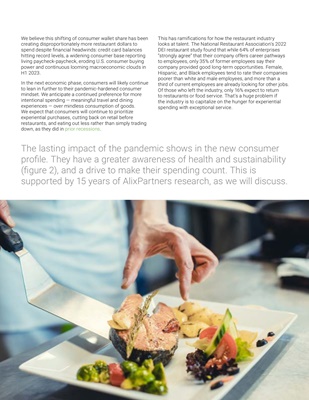
The rise of the experiential consumer, and why DE&I is the future of the U.S. restaurant industry 4
We believe this shifting of consumer wallet share has been
creating disproportionately more restaurant dollars to
spend despite financial headwinds: credit card balances
hitting record levels, a widening consumer base reporting
living paycheck-paycheck, eroding U.S. consumer buying
power and continuous looming macroeconomic clouds in
H1 2023.
In the next economic phase, consumers will likely continue
to lean in further to their pandemic-hardened consumer
mindset. We anticipate a continued preference for more
intentional spending - meaningful travel and dining
experiences - over mindless consumption of goods.
We expect that consumers will continue to prioritize
experiential purchases, cutting back on retail before
restaurants, and eating out less rather than simply trading
down, as they did in prior recessions.
This has ramifications for how the restaurant industry
looks at talent. The National Restaurant Association's 2022
DEI restaurant study found that while 64% of enterprises
"strongly agree" that their company offers career pathways
to employees, only 35% of former employees say their
company provided good long-term opportunities. Female,
Hispanic, and Black employees tend to rate their companies
poorer than white and male employees, and more than a
third of current employees are already looking for other jobs.
Of those who left the industry, only 16% expect to return
to restaurants or food service. That's a huge problem if
the industry is to capitalize on the hunger for experiential
spending with exceptional service.
The lasting impact of the pandemic shows in the new consumer
profile. They have a greater awareness of health and sustainability
(figure 2), and a drive to make their spending count. This is
supported by 15 years of AlixPartners research, as we will discuss.